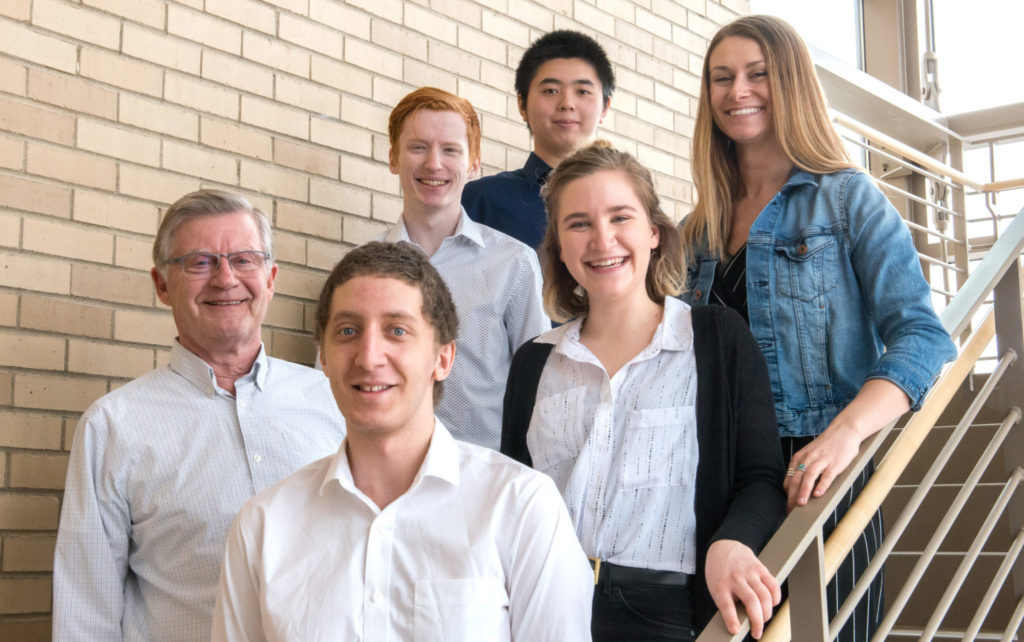
How can you avoid shady landlords, register a house party online, or teach cybersecurity to children? Five undergraduates tackled those challenges at this spring’s hackCU hackathon and were recognized for their creative solutions.
HackCU, hosted by the University of Colorado Boulder, is an intense 24-hour invention marathon offering multiple prizes in over 20 categories. Teaming up with students from other institutions, 20 CSU students competed against 600 participants from around the globe.
Computer science department undergraduates Claire Goldstein, Aislinn Jeske, Huy Nguyen, Kareem Youssef and mathematics student Derek Larkins – most first-time hackathon competitors – took honors in three different categories. The students were advised by Special Assistant Professor Joe Gersch.
Inventing workable solutions to different problems
From health care and the environment to finance and communications, computer scientists solve an array of practical, real-world problems. At hackCU, the computer science students and their teammates worked nonstop, napping in shifts, to produce three winning projects.
Hackathon newcomers Claire Goldstein and Aislinn Jeske took first place in the Smart Contract: Beginning Blockchain Challenge for developing a smart contract – a cryptocontract encoded into blockchain – that makes information about college rental properties more transparent. The honor included a $375 prize for each of them.
“We want to know the status of rental properties before we move in,” Goldstein said. “We want to know what other renters have paid so we know the market is fair.”
Winning first place for Best Use of Typeform API, Derek Larkins and Kareem Youssef teamed with students from CU and Arizona State University to build PartyLink, an app that makes registering a party easier and less confusing. Each winning team member received a collector’s edition of Makey Makey, an invention kit that allows users to connect everyday objects to computer programs.
The group said that party registration at college campuses is currently a tedious process. With PartyLink, they said students can register their parties, college campuses can track parties to ensure everyone’s safety, and students can find and RSVP to registered parties.
Freshman Huy Nguyen said he stepped out of his comfort zone. He went to the competition alone hoping to join a team there. His adventurous attitude paid off. Nguyen and three undergrads from CU formed an all-freshmen squad that went head-to-head against 25 other teams to snatch second place in Design, Build or Break Cyber Games for K-12 Education. Their project, a cybersecurity escape room, is a puzzle game aimed at middle school students. Their second place prize was licenses for Circadence Project Ares, a cybersecurity learning platform.
“I didn’t know anything about Python. So I created the maps in Java, and one of my teammates translated it to Python,” Nguyen said.
All projects were judged on four criteria:
- Technology: How technically impressive was the hack?
- Design: Did the team put thought into the user experience?
- Completion: Does the hack work?
- Learning: Did the team stretch themselves?
Awards were announced at the event closing ceremony.
Hackathon – it’s not what you think
The word “hackathon” immediately brings to mind cyber crime. But a hackathon is simply a 24-48 hour design sprint with a specific focus. It is a highly creative problem-solving event, where teams collaborate intensively on a project with the goal of creating a functioning product by the end.
There are niche hackathons where teams create websites, mobile apps, operating system variations, and video games. Altruistic hackathons solve problems for public transport systems, education and disaster response. Corporate hackathons encourage employees to participate in new product development. Language or programming hackathons are dedicated to programming languages or framework applications. There also are hackathons for specific demographic groups or developers with specific proficiency levels and experience.
Hackathons are exciting social events – and they are wildly popular. First place winner Goldstein was surprised by her first hackathon.
“It wasn’t as hypercompetitive as I expected,” she said. “It was relaxed, collaborative, social, encouraging and fun. Getting to work with people in industry also helps you see how the work you are doing in school is applied in the real world.”
Along with prizes and plenty of food to fuel participants, hackathons can offer workshops, presentations, recruiting events and more.
Freshman winner Nguyen encourages other students to participate, not just in hackathons, but in the department’s activities and community.
“Exploring opportunities and meeting people is more satisfying than staying home and working on an assignment alone,” he said. “It can be really intimidating to jump right into a situation by yourself, but if you just meet the obstacle head-on, you can accomplish anything.”
Interested in hackathons? The Department of Computer Science at CSU will host the HackCSU – Blockchain Hackathon at the new Canvas Stadium on campus May 3-5. Click the link to register and join the fun.